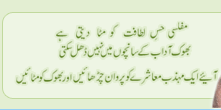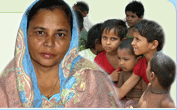|

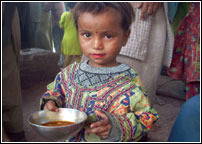 Nassera H. Japanwalla talks to Parveen Saeed, the pioneer of the three-rupee-meal, who believes everyone can do their bit to change the world Nassera H. Japanwalla talks to Parveen Saeed, the pioneer of the three-rupee-meal, who believes everyone can do their bit to change the world
In these challenging times, when people have become consumerist to the core, a petite, unassuming person like Parveen Saeed, stands out like a giant.
Her struggle to help the vulnerable segments of society started way back in the year 2000, when Saeed read about a woman who killed two of her children because she could not afford to feed them. The pain reverberated in her soul and awakened the philanthropist within. She vowed that she would try and feed as many people as possible. After meticulous calculation, she decided she could feed five people on a daily basis from her limited income and thus the foundation of Khana Ghar was laid.
Saeed’s first customer was a vegetable vender who could ill afford regular meals at roadside cafes, as even the cheapest of these came to a hefty Rs20. Saeed’s offer of two chapattis and a plate of gravy for a mere Rs2 sounded too good to be true and he jumped at it. Soon word spread among the poor and hungry and they flocked to her house, and Khana Ghar became a landmark in Surjani Town. The initial response was overwhelming to say the least.
When asked why she charges this nominal amount, a sum that does not even buy one a chapatti in this age of recession, her reply is impressive for its profound underlying reflection. “Each meal used to cost me Rs10 in those days, and though I wanted to feed the poor, I did not want to hurt their dignity by giving them free food which would be tantamount to charity,” explains Saeed.
In a week’s time, word spread and soon she had 15 to 20 people, clamouring for subsidised meals. Saeed’s meagre resources had been overburdened but her relatives started to contribute generously to make ends meet, then friends joined in as well.
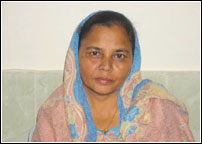 However, Saeed also had to deal with opposition from the people who ran cafes and dhabas in that area. This was one group who was not happy with Khana Ghar, as it spoilt their business and, on one horrific occasion, an angry mob actually attacked and demolished her tandoor. She was at her wit’s end till Taslim Siddiqui, from an NGO called Sahebaan, brought her to Khuda Ki Basti and arranged the premises for her. However, Saeed also had to deal with opposition from the people who ran cafes and dhabas in that area. This was one group who was not happy with Khana Ghar, as it spoilt their business and, on one horrific occasion, an angry mob actually attacked and demolished her tandoor. She was at her wit’s end till Taslim Siddiqui, from an NGO called Sahebaan, brought her to Khuda Ki Basti and arranged the premises for her.
Nowadays, she manages to provide subsidised meals to an average of 200 people on a daily basis. While we were sitting in her room, which had spotless clean, white washed walls, a rickety fan and a few chairs and tables, my eyes fell on a sign on the wall which asked people to wash their hands before eating. Parveen Saeed provides soap and water for that too. We watched poor, shabbily dressed children come with a bowl, clutching Rs3 to get their meal for the day. Charges have gone up from Rs2 to Rs3 as inflation has made its mark on Khana Ghar, too.
Interestingly, quite a few families are fed free of cost, after Saeed made inquiries and learnt that they cannot manage to pay for even one meal. Labourers who are on daily wages and people who earn just a few thousand and have many mouths to feed find it difficult to spare money for a square meal after deducting expenses for rent, utilities and medicines.
Donations are quite sporadic and though friends, family and relatives pitch in, Khana Ghar is becoming more and more difficult to run. Apart from the monetary factor is the fact that the entire cooking of 200 people is done using wood as a fuel. “If I use a gas connection, the rates would come under commercial tariff and I can’t afford that,” says Saeed.
It is sad that, while many unscrupulous people find a way to cheat utility companies, a philanthropist organisation suffers due to rigid tariff structures. House rent and wages to four employees are the other factors that increase her overheads and add to the financial burden.
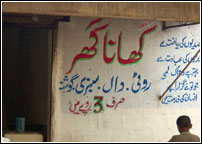 A few months ago she was interviewed on a TV show and for a while Saeed was inundated with donations. It was Ramazan and the spirit of charity was at its peak. People sent money, clothes, ration and groceries, so much so that she gave ration to 350 families, clothes to 100 families and Iftar to 300 people daily, besides that, she also sent food to people sitting in Eteqaf in mosques. However after Ramazan, the donations gradually trickled down. A few months ago she was interviewed on a TV show and for a while Saeed was inundated with donations. It was Ramazan and the spirit of charity was at its peak. People sent money, clothes, ration and groceries, so much so that she gave ration to 350 families, clothes to 100 families and Iftar to 300 people daily, besides that, she also sent food to people sitting in Eteqaf in mosques. However after Ramazan, the donations gradually trickled down.
In a settlement like Khuda Ki Basti, which is a close-knit neighbourhood, Saeed knows most families on first name basis and has become an essential part of their lives. In this way she learns their real problems and tries to help out.
Apart from providing free food she also runs a clinic where doctors charge a flat fee of Rs10 inclusive of medicines, medical check-ups, etc., however, her good work does not stop here. She has a Mohallah Sangath Programme which is targeted towards childcare, mother care and family planning. A Lady Health Visitor pays a visit to the houses in turn and invites ladies for a lecture on family planning and good hygiene habits. There are trained dais who deal with deliveries and guide new mothers in the proper care of newborns. She wistfully adds, “If I had my own hospital I would do so much more for these deprived people.”
These days Parveen Saeed is looking forward to opening another food outlet in an equally needy area for which she is looking for donors.
Her passion and zeal are inspiring, especially when one considers the fact that she has done her MA in Journalism from Karachi University and can easy opt for a lucrative job; instead she is content to devote her time, money and extraordinary level of energy into feeding and helping the city’s deprived masses.
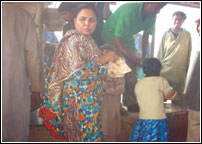 Saeed has two daughters and when asked if she is ever concerned about their future, she replies, “No, I have ultimate faith in providence.” Saeed feels that making the world a better place does not need a gargantuan effort by any one individual; instead, it needs just a small gesture from a number of people. “If every family who can afford to buy flour for their household donates just a handful from it, it would be enough to feed a multitude of hungry people.” Saeed has two daughters and when asked if she is ever concerned about their future, she replies, “No, I have ultimate faith in providence.” Saeed feels that making the world a better place does not need a gargantuan effort by any one individual; instead, it needs just a small gesture from a number of people. “If every family who can afford to buy flour for their household donates just a handful from it, it would be enough to feed a multitude of hungry people.”
Perveen Saeed’s example shows that making a difference is not about huge amounts of money; it’s about dedication, commitment and a real desire to help people.
| 

